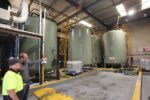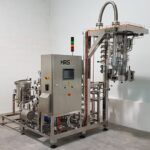Food waste initiative delivers potential for environmental advances
JJ Richards and Sons NSW/ACT Operations Manager Benjamin Martis, right, discusses the plant’s waste management 28-ton receiving tanks and processing tanks with CST Wastewater Solutions Engineer Peter Bambridge pICTURE:p Waste management leader JJ Richards & Sons is proving an environmental initiative in Sydney that eliminates landfill dumping of commercial and retail food waste by transforming it into valuable green energy and fertiliser. The company’s custom-engineered waste reception centre at Seven Hills – which its designers say has demonstrated potential to become a model for national use – processes pulped waste from its partner Pulpmaster’s collection tankers into an easily handled and valuable resource for use in agriculture, horticulture and fossil fuel replacement. The plant – which already handles bulk waste from major customers including supermarkets, food shops, hospitals, schools and catering facilities – uses CST Wastewater Solutions’ KDS multi-disc fine screening and compaction technology as part of its automated process that turns the pulped waste collected into a cake form that is more than 50 per cent lighter and dryer than the pulp and which can be transported to users for half the cost of heavier and less hygienic output. Waste producers using the system get monthly reports on how much they are saving on disposal costs, while simultaneously reducing their environmental impact. The material is used by farms and other agricultural enterprises as high potency fertiliser and for the production of biogas to reduce their environment footprints whilst simultaneously boosting their output with natural fertilisers and fossil fuel replacement green energy. The system not only disposes of an environmental headache and cost for responsible businesses – including high landfill costs and the high cost of transporting waste to somewhere remote, secure and non-harmful – but turns the problem into an environmental asset – and a cost saver. Businesses love getting […]









